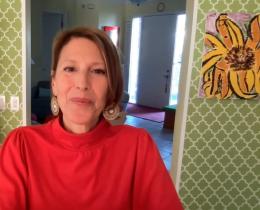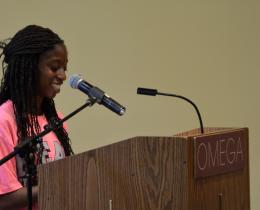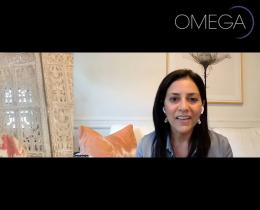Omega: What motivated you to write memoirs versus novels or other styles?
Marta: I grew up expecting to be a novelist. All my idols were novelists. As I was coming of age, the novel was the king of literature, and that was certainly what I was reading in the ‘70s and ‘80s.
I think the first experience of nonfiction for me was in 1981. I read Pilgrim at Tinker Creek by Annie Dillard, which made a big splash when it came out, and it made a big impression on me. Here was someone simply writing about her day. I experimented with that form for a while and started to write that way.
Almost 20 years later, I was in an MFA program and wanted to write the story of what later became the memoir, The Imposters.
I started it as a novel, but the result just felt very disappointing to me. It didn't have any spine. The writing didn’t sound the way I wanted it to sound, and I didn't know why. I just assumed I was a terrible writer.
At the same time, I had just started taking the Authentic Writing workshops with Fred Poole. The focus there was real life. I loved the workshop right from the first moment. I immediately started writing directly from life, and that was so much more satisfying. Instead of eating a watercress salad, it felt like I was eating a big deli sandwich. I could really get my teeth into it. And I haven't let go of that ever since.
I find, just naturally, that I prefer to read something real, somebody's real story rather than a novel. Unless the novel is from the 1920s or before, from a time when memoir wasn't a land you could walk through. Memoir just wasn't in the culture the way it is now. If I had been born in 1922, I would've written a novel, because writers had almost no choice but to put themselves in their novels. There are some outstanding early novels that I just accept as memoir, because they have the voice of memoir from that time.
For me, some of the best memoirs describe, perhaps, a very ordinary life. My favorite moments are the ordinary moments. I love when someone can write about very normal, regular everyday things, and just make me see them. For me, that's the thrill.
Omega: At the center of both of your memoirs, The Guru Looked Good and The Imposters, is a young woman searching for belonging and purpose, and her own voice. How did you ultimately find this in your life, and did it come in the way you expected?
Marta: The person I portray in those books is definitely unsure of herself, most of the time. And certainly as a writer, I was extremely, painfully unsure of myself. My writing life, until 20 years ago, was very much stop and start, stop and start. I would give up on myself as a writer and feel so disappointed. I would set it aside, and then it just wouldn't leave me alone. Then, I'd pick it up in a huge wave of enthusiasm and optimism, and off I'd go again, "Yes, I'm gonna do it," and then I’d lose faith. The cycle would repeat.
Two things helped me. One was the process of getting older. It helped in becoming stronger in myself as a person. It is just a natural process that happens as life continues. But as a writer, it's the workshops I teach that have made the difference because I have been participating in them without a break for 20 years.
At first, I was simply a participant, and now I am the facilitator. Just by having a reason, a motivation, to always keep writing, I have not been able to stop.
I still get horrible phases of not believing in myself. I never have had an indomitable spirit of myself as a writer; it's always a tentative, vulnerable thing. There are plenty of times when I just don't think I have what it takes. But then, it's time for a workshop, and there I am, writing again.
I wish that for everyone, because if you can find a way to keep writing during those dark times when you think your words are hideous, then you will keep writing. It's the continuation of your writing that makes a difference, that strengthens your writing, improves it, and makes you into a writer.
Omega: What do you find your students write about most?
Marta: I think that so much of the writing that I'm interested in, and that takes place in my workshops, is just what comes up and out of the pen of its own accord. When we begin writing in each workshop, I ask everyone to not have a plan. Most of us pick up the pen or pull out the laptop, and we really don't know where we're going to start.
Omega: What influences your style of teaching?
Marta: I can't say that I have any major teaching influences, except for my husband, Fred Poole, who originated the Authentic Writing Workshops. So, I have to give him credit. The way we function as facilitators and the way we show support is very personal. I learned a lot from him. He was my original writing teacher in this context, and that made a huge difference in my writing life.
Omega: You’ve taught writing to all kinds of students from young leaders to cancer survivors to people in correctional facilities. What have your students taught you about writing?
Marta: There is so much discussion out there about who can write and how to do it. I have heard the most beautiful writing from people doing it for the first time; people who don't read; people who haven't even gone to school. If someone writes from life, I love their writing. And of course, there are people who just shine right away in the workshops, and it can come from anywhere.
I was raised to think that certain people are the writers. I've really turned my back on that, because I have not found that to be true at all. I really believe that if you're interested in writing, you can do it. If you can speak and if you can think in language, you can write. That's really all you need in terms of the nuts and bolts.
The only other necessary ingredient is courage, because it does take a lot of courage to accept the words that are inside. But that's a muscle that can be developed.
Omega: What practices help fuel your own writing practice?
Marta: A little thing I do is to wear earplugs when I write. I must have tried it once when I was someplace noisy. I have found that even when it's quiet and I don't have to block out sound, it quiets my thoughts, just a little bit.
I like writing in cafés and writing in busy places too, but I don't always have a café to go to. In the end, I write any place.



